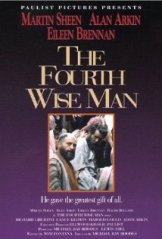Do you have a favorite Easter movie? As Catholics, Easter is our biggest feast, and our greatest liturgical season. It’s also the longest season, apart from Ordinary Time. However, I’ve discovered that, unlike Christmas, very few people have a tradition of watching Easter movies. Here’s my top ten Easter movies list:
is the little-known, well-acted TV adaptation of Henry Van Dyke’s classic story. With Martin Sheen and Alan Arkin, The Fourth Wiseman had the faith to search for the newborn King, and the love to stop to help those in need that he meets on the way. This 1985 movie highlights these words of Jesus: “Whatever you do to the least of these, you do unto me.”
Martin Sheen is in our #9 film as well. The Way—recently released to DVD–is the story of a wealthy widower who receives the news that his son has died while trying to make a pilgrimage to the Cathedral of St. James, better known as “el Camino del Santiago.” In trying to complete his son’s footsteps, the wounded father goes on his own spiritual journey to discover freedom and new life. This is a less overtly religious film than most of the others that I’ll mention, but symbols and themes of faith are hidden in the characters’ journeys.
 8. The Ten Commandments directed by Cecil B. DeMille is often shown on TV during Holy Week, and deservedly so (for both Christians and Jews). This critically acclaimed 1956 masterpiece that portrays Passover is a great way to spend 3 ½ hours. I found the first half of the film, which sets up Moses’ character, particularly compelling. (If you’d like an alternative that the entire family can watch together—including the kids—I recommend the animated Prince of Egypt from 1998.)
8. The Ten Commandments directed by Cecil B. DeMille is often shown on TV during Holy Week, and deservedly so (for both Christians and Jews). This critically acclaimed 1956 masterpiece that portrays Passover is a great way to spend 3 ½ hours. I found the first half of the film, which sets up Moses’ character, particularly compelling. (If you’d like an alternative that the entire family can watch together—including the kids—I recommend the animated Prince of Egypt from 1998.)
The Acts of the Apostles—the book of the Easter season—is extraordinarily well presented in this 1985 TV mini-series. The Acts of the Apostles is full of the excitement and joy of the Resurrection that transformed the lives of the first Christians. Watching A.D. is a wonderful way to open our eyes to notice some of the details of the Acts of the Apostles.
 6. & 5. The Voyage of the Dawn Treader (2010) and The Lion, the Witch, and the Wardrobe (2005) from The Chronicles of Narnia.
6. & 5. The Voyage of the Dawn Treader (2010) and The Lion, the Witch, and the Wardrobe (2005) from The Chronicles of Narnia.
The Chronicles of Narnia bring C.S. Lewis’ vision of faith to the young of heart. There are references to the Gospels everywhere—more overtly in The Lion, the Witch, and the Wardrobe, which metaphorically retells the story of Jesus’ Passion, Death, and Resurrection. If I were recommending Easter reading, the Narnia series would be at the top of my book list.
4. Changing Lanes.
Taking place mostly on Good Friday, Changing Lanes is about the consequences of our choices—starting with distracted driving and road rage. Two spiritually wounded and increasingly desperate men are forced to confront their choices and their life’s direction. An unlikely but perfect fit for an Easter movie. (Not for children.)
3. Chocolat.
Who hasn’t given up chocolate for Lent? Whether you have or not, Chocolat is a thought-provoking Easter film. Its playful approach to Lent, Easter, and small village life pokes holes in the hypocrisy of making Lenten sacrifices while ignoring or hurting our neighbor. By Easter morning, the key characters and the entire town come to a new place of hope. Although not appropriate for children, this film raises good questions about inclusion, self-denial, and the Gospel call to love.
This 1977 TV miniseries is still the most popular life of Jesus. Reverent and based on the Gospels, Jesus of Nazareth brings to life the Gospel passages—especially those times when the Gospel is terse and lacking in detail. For those who have seen Jesus of Nazareth many times, a more recent alternative might be The Gospel of John, which has my favorite cinematic version of the Washing of the Feet and Jesus’ Priestly Prayer.
1. Ben-Hur. This amazing 1959 film based on the novel, draws us into the story of a wealthy Jewish man living at the time of Jesus who is sold as a slave but eventually makes his way home to plot his revenge…and encounters Jesus. Ben-Hur swept the Academy Awards, winning 10 Oscars. It is a profound story of transformation and faith, and it’s my personal favorite.
When I gave this list on Salt + Light Radio, my host Pedro Guevera-Mann chimed in with his own favorite, Jesus Christ Superstar.
So there you have them—a list of great films for the 50 days of Easter! I’m not promising to try to see all of them during Easter 2012, but I will see at least a couple. If you have other favorite Easter films, please post in the comments.
Blessed Easter!








Pingback: “Rising To New Life” in the Movies | Windows to the Soul Blog
Chocolat is nothing that should be recommended – unless it’s “what to avoid, lest you have an occasion for sin”. The USCCB calls it “morally offensive” and americancatholic.org says “not recommended”. Catholic critics listed it as an “anti-Catholic” movie – traditioninaction.org titles their review “chocolat laced with poison”. While the Lenten theme is there, and the acting is good, the content, theme of “follow your pleasures”, nudity, sexually explicit aspects are not at all what a Catholic should support, let alone endorse.
LikeLike
Dear Terry,
Thank you for your comment and for pointing out that the film, Chocolat, is problematic for some people. I probably should have made that clearer in my short comments, also adding that Chocolat is not a family film because it’s definitely not for children.
One of the principles of media literacy is recognizing that art has different meanings for different people. While I respect that many people would not like the film Chocolat, many people can appreciate the critique of hypocrisy and “pharisaism” found in this film.
Does the film get everything right? No it doesn’t–and films aren’t theological treatises so they rarely do. But Chocolat raises some good questions: What is self-denial and what is the value of self-denial during Lent? Is self-denial/a spirit of penance more important than welcoming those who are “outsiders,” especially those who are suffering? Who are we called to welcome as followers of Jesus Christ?
(Just today, the priest at the parish I went to challenged us to reflect: Does my practice of my chosen Lenten penance make me think that I am better than others who aren’t making the sacrifices I’m making?) Hypocrisy and the sin of being overly legalistic to the point where compassion of others is lost are key themes in this film–points that Jesus raised with the Pharisees.
While the portrayal of the Catholic Church in the film is admittedly harsh, it is also clear that the local parish is manipulated by the mayor of the town (who is so controlling that he edits the young priest’s homilies), and that to him, external conformity is more important than compassion. Actually the parish priest, though young and inexperienced, comes across really well by the end of the film: as compassionate and committed to the Gospel of Christ.
There are certainly things in this film that are problematic; and a light-hearted fable about an imaginary parish withe exaggerated stereotypes is certainly not going to appeal to all. But from my several viewings of the film, I see it as a fable that looks at hypocrisy vs. inclusion. And it makes some good points.
Unfortunately, my favorite reviews of the film aren’t available online, but here are a couple that show the film’s richness in the area of spirituality and faith:
http://www.spiritualityandpractice.com/films/films.php?id=2567
http://www.textweek.com/movies/chocolat.htm
Thank you again for bringing the incompleteness of my comments to my attention!
LikeLike